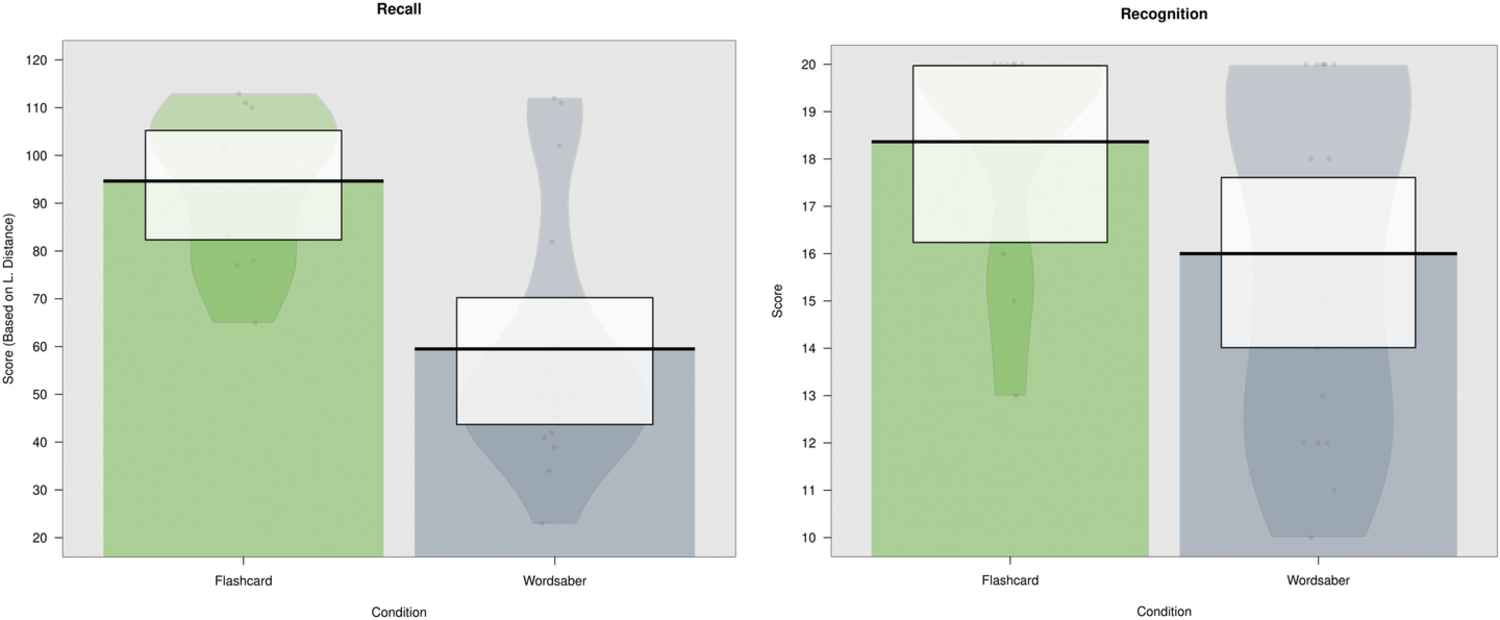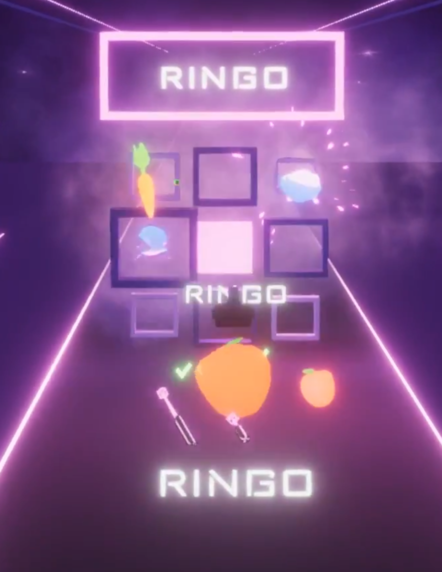Word Saber – Vokabellernen in VR
Word Saber ist ein Lernspiel in VR zum Vokabellernen. Die Spielmechanik ist inspiriert von Beat Saber, bei dem die Spieler:innen auf sie zufliegende Würfel mit Lichtschwertern treffen müssen. Bei Word Saber wird ein zu übersetzendes Wort angezeigt und statt der Würfel fliegen den Spieler:innen verschiedene Gegenstände entgegen. Die Evaluation ergab, dass Word Saber dazu geeignet ist efktiv Vokabeln zu lernen, wenn auch nicht so effizient wie eine herkömmliche Lernmethode mit Karteikarten. Jedoch konnte gezeigt werden, dass VR-Lernspiele einen Einfluss auf die langfristige Motivation der Lernenden haben können, da die Teilnehmer:innen der Word Saber Gruppe angaben mehr Spaß zu haben beim Vokabellernen, als die der Vergleichsgruppe.
Word Saber is a virtual reality (VR) Game for vocabulary learning, an essential part of language learning. The famous game Beat Saber inspires the game, but Word Saber’s focus is not on the beat but on hitting the correct item from different items, depending on the displayed target word. We evaluated it in terms of learning success and motivation. Our findings show that Word Saber is effective for vocabulary learning but not as efficient as a traditional vocabulary learning method. But the participants reported having more fun and being more motivated with Word Saber.
The game consists of three phases. In the first phase, the learning phase, the new words are introduced to the player. After that, in the second phase, the player is asked to recall the new words for themself. In the third phase, the actual gaming phase, the player has to choose the correct item corresponding to the displayed target word. By selecting the correct items several times in a row, a Combo can be achieved, and an overall high score is calculated.
For the evaluation, we choose a between-subjects design, with one group using Word Saber for about 20 minutes and the other group using traditional flashcards for the same time. We choose Japanese as the target language, as it is rarely spoken in Germany, but the game design is independent of the target language. The Japanese words were written using the Latin alphabet (Rōmaji).The learning success was measured in terms of recall and recognition abilities. For recall, images of the objects were given, and the participants were asked to write down the Japanese word or as much of it as they could remember. After that, for recognition, the Japanese words were given, and the participants were asked to translate them. The participants were also asked to complete a self-report questionnaire on fun, motivation, the difficulty of the task, perceived success, and perceived duration.

We found significant effects, with flashcards outperforming Word Saber in both measures.
For the questionnaire, four questions had significant results, showing that Word Saber was perceived to be more fun, participants had a higher willingness to continue playing, and the game was perceived to be more difficult. However, in the Flashcards condition, the feeling of being successful was higher.
To sum it up, we developed Word Saber, a VR vocabulary learning game, which is effective but not as efficient as using flashcards. Still, participants reported having more fun and being motivated after playing it, so the long-term effect of playing it regularly could be investigated in future studies.
Referenz
Judith Hartfill, Jenny Gabel, Daniel Neves-Coelho, Daniel Vogel, Fabian Räthel, Simon Tiede, Oscar Ariza, and Frank Steinicke. 2020. Word saber: an effective and fun VR vocabulary learning game. In Proceedings of the Conference on Mensch und Computer (MuC ’20). Association for Computing Machinery, New York, NY, USA, 145–154. DOI:https://doi.org/10.1145/3404983.3405517
Kontaktdaten
Judith Hartfill
Wissenschaftliche Mitarbeiterin
Arbeitsbereich Human-Computer Interaction
Universität Hamburg
E-Mail: hartfill@informatik.uni-hamburg.de
Telefon: +49 40 42883-2148
